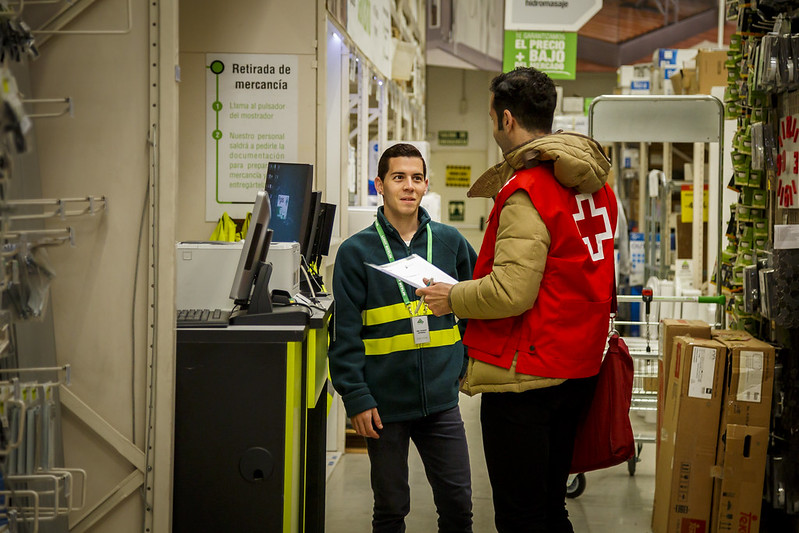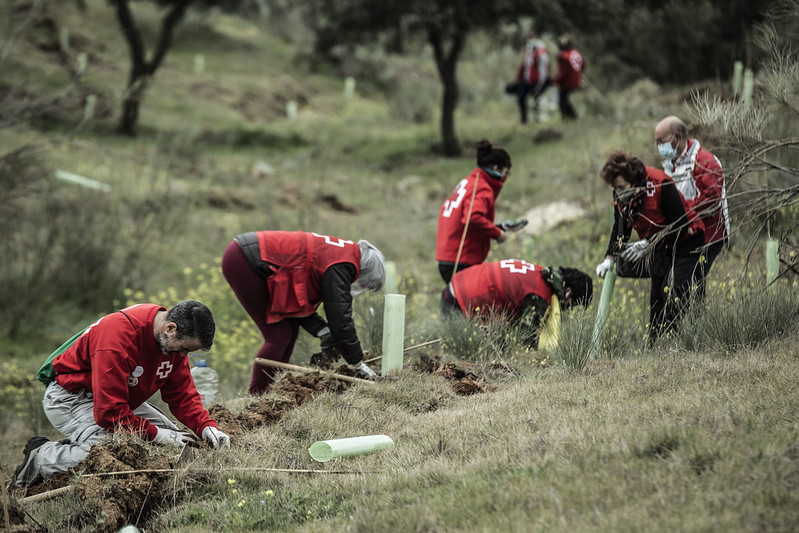Three core priorities for the Spanish EU Presidency
With Spain currently presiding over the Council of the EU, the Spanish Red Cross is mobilised in Brussels and across Spain to promote the voices of volunteers and the people they assist in national and European discussions. In line with the current focus of the Trio and the Spanish Presidency agenda, these efforts prioritise the needs and rights of people in situations of vulnerability across three key issues:
- Creating a More Equitable and Socially Responsible Europe that Upholds Rights and Values
Despite Europe's notable levels of social protection, great social challenges persist. Inequalities, discrimination, an unstable and precarious job market, and the disproportionate impacts of the economic crisis on vulnerable groups are just a few examples of these difficulties. Throughout the current presidency, the Spanish Red Cross will call on leaders to take action to promote the integration of people in vulnerable situations into economic, labour, social, and cultural life to bridge the inequality gap and curb discrimination. More should also be done to fight barriers and to ensure access to rights for the most vulnerable individuals, including women in social difficulty, young people, children, older people, migrants and people experiencing homelessness. This encompasses the ability to be able to exercise the right to health, particularly mental health, as an integral part of healthcare.

- Building a Climate-Neutral and Green Europe, Leaving No One Behind in the Transition
The array of environmental changes resulting from human actions on the planet constitute one of the greatest challenges for the world and for Europe. It leads to environmental disruption and climate change, with dire consequences for vulnerable communities and individuals. To support a just economic transition that includes everyone, the Spanish Red Cross will continue to highlight the need to support people experiencing energy poverty and the importance of mitigating energy vulnerability in households with fewer resources. Over the coming months, the Spanish Red Cross will also advocate increased commitments to climate action, while promoting proactive adaptation measures and early warning systems.

- Addressing Global Challenges and Fostering Multilateralism, while Prioritising Fair EU External Relations Placing People at the Centre
Humanitarian needs are increasing in reverse proportion to the available resources, making it difficult to assist the people who are most in need. For this reason, the Spanish Red Cross will promote strategic partnerships and the implementation of the triple nexus approach for a more effective humanitarian response. Facilitating access to humanitarian aid and protection for individuals who are victims of violence, conflicts, or disasters, as well as those in vulnerable situations during migratory routes, is also crucial. The Spanish Red Cross will promote action to strengthen livelihoods and call on the EU and Member States to persist with their commitments to women’s rights and gender equality, as well as to empowering local actors through localisation.
Download the Spanish Red Cross priorities for the Spanish EU Presidency
During the first part of the Spanish Presidency, the Red Cross has engaged in a wide range of EU events and meetings to voice recommendations based on the observations of our volunteers and our expertise developed through work with affected communities. For example, at the Partners for Change Forum in the margins of the EU-CELAC Summit in July, Red Cross representatives from both regions shared views on how the EU partnership with Latin America and the Caribbean should be reshaped to address key challenges and the most pressing needs. We also contributed to the informal Employment, Social Policy, Health and Consumer Affairs Council (EPSCO) meeting in Madrid in July, participating in a panel discussion on the role of the 3rd sector at the EU and national levels. It was an opportunity to stress the need to include not-for-profit organisations in the development of social policy initiatives and to invest in not-for-profit health and social providers to ensure both accessibility and quality services for all. While in September, the Red Cross was invited to address the European Commission and EU Member States on the topic of anticipatory action during a meeting of the Working Party on Humanitarian Aid and Food Aid (COHAFA).
In the coming months, the Red Cross will continue to create and seize opportunities to give visibility to the needs of the communities and individuals that we serve. For instance, the International Federation of Red Cross and Red Crescent Societies (IFRC) World Disasters Report will be launched in the framework of the Spanish Presidency in November to share the main learnings and best practices from the COVID-19 response, with a particular focus on mental health and socio-economic inequalities. As negotiations continue around the EU Pact on Migration and Asylum, we will reiterate our call for a human-centred reform that enhances mechanisms for identifying and addressing individual needs and vulnerabilities.
For media inquiries, please contact Eva Oyón on: eva.oyon@redcross.eu or +32 2 235 09 22

